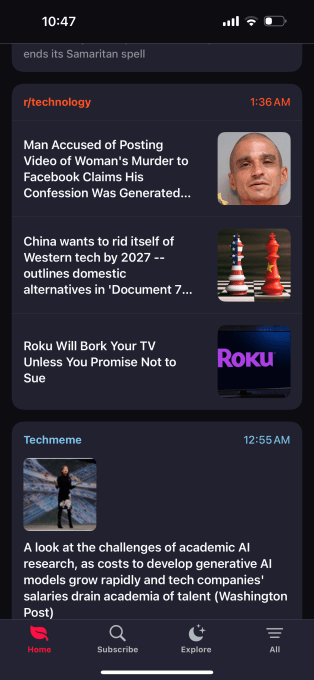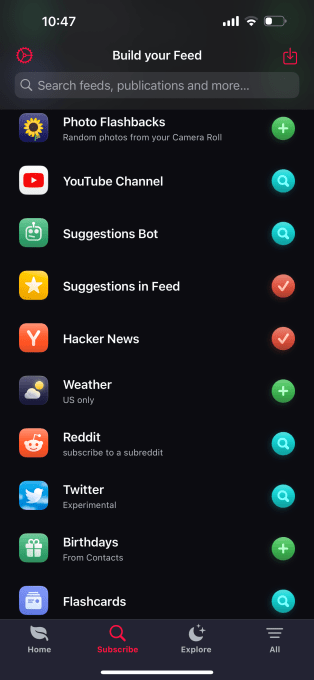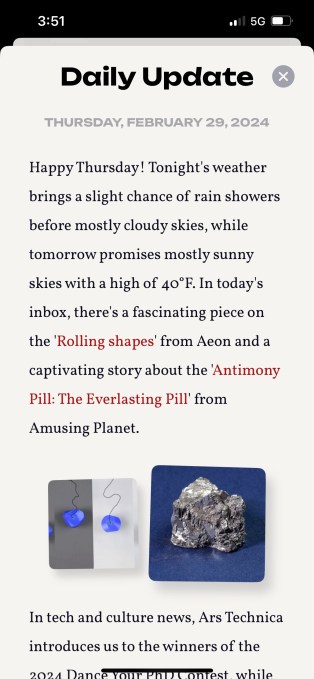In the last 12 months, reader apps have adopted AI to change how users consume news. Instagram co-founders’ now discontinued Artifact introduced AI-powered summaries and headlines. Newer apps like Bulletin and former Twitter engineers’ Particle are taking similar approaches. However, developer Nate Parrott’s app Feeeed (it’s four Es), which is available for iPhones and iPads, focuses more on creating an algorithmic timeline to combine different sources.
The app
Just like any reader app, Feeeed lets you add RSS feeds to your timeline. But then there is an array of other options such as newsletters, YouTube channels, Hacker News, subreddits, Mastodon profiles, Tumblr blogs and Twitter accounts. You also can add birthdays, weather (U.S. only), step count, photo flashbacks, personal reminders and flashbacks. The most unique integration is a way for you to track a part of a web page.

The home feed shows a mix of posts from the sources you follow. The posts, which appear in a card format by default, aren’t in chronological order. Unlike other RSS readers, there is no read count to get through as the idea is to discover content rather than reaching “Inbox Zero” for a reader. But if you feel the urge to catch up to the latest posts, you can pin a “Latest” tab to the bottom bar. Alternatively, you can change the feed ranking from “Best Variety” to “Chronological.”

The main feed is empty until you start following sources from places like the “Subscribe” and “Explore” tabs. For better discovery, Parrott added occasional source suggestions and an AI-powered bot to the app last year. The bot can suggest things in response to a query like “What are some of the blogs or newsletters that talk about Football (Soccer).”
Building Feeeed
Parrott told TechCrunch over email that the process of building the app started during the pandemic when there was a strong urge to continuously scroll. He built something for himself with different sources.
“The impulse to take out your phone and just flick is so strong. I’ve tried to quit various social media apps at various times, and it’s never worked, so I thought: why not just embrace the urge to scroll, and redirect it to something valuable? I wanted a news feed for myself, on my own terms,” he said.
“The whole idea of a news feed for yourself, on your own terms is still key to understanding the app, I think. You pick what’s important and Feeeed reminds you about it. You can pick the icon, the tabs, the algorithm, the layout.”

Parrott said that he didn’t build a recommendation engine at first. However, after releasing the app in 2022, he realized that content discovery was a top demand for users.
“I think the idea of a scrollable, infinite feed is a really powerful thing. It’s habit-forming. You can see that as a bad thing, or you can see it as a reality of our relationship with technology, and say, ‘Hey, if I’m gonna scroll a feed while I’m waiting for the train, then can it at least remind me that I should text my friend on their birthday?’” he said.
What’s coming up?
While there is room for AI-led implementation in the space, Parrott doesn’t believe in using the tech to get more news faster to people. Rather, he wants to explore ways for people to follow more sources including podcasts, local news and niche websites.
Feeeed is currently testing a feature of showing AI-generated daily updates. In addition to that, Parrott is working on feed and notification customization.

Parrott noted that long-term, he wants to help people discover personalized content without doing a lot.
“The big challenge for Feeeed is giving people a feed that feels deeply personal without asking them to do too much work. Apple News is popular because there’s zero setup work,” the developer said.































Comment